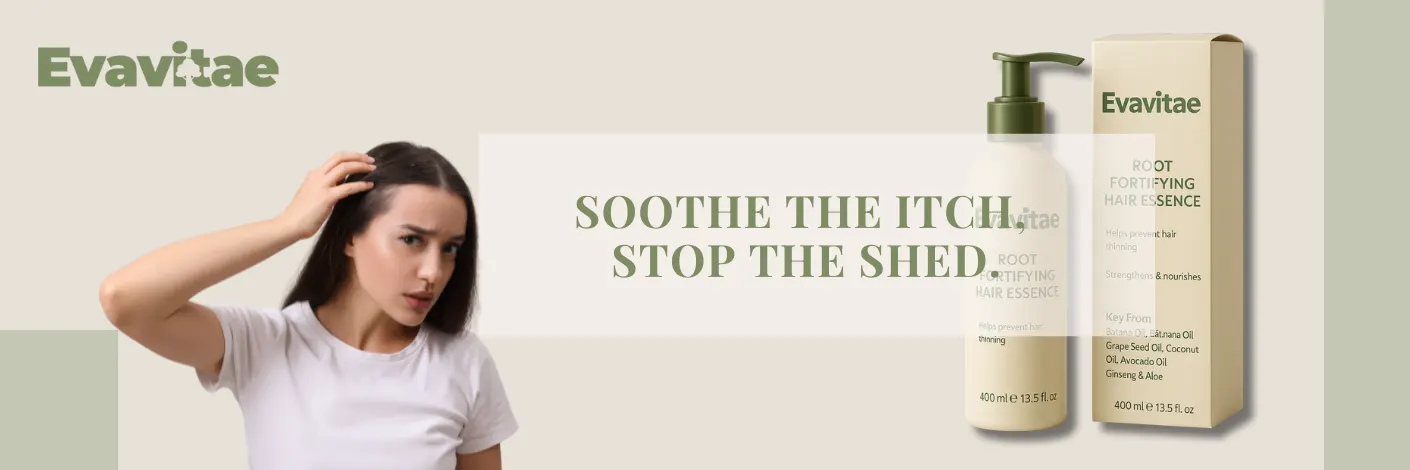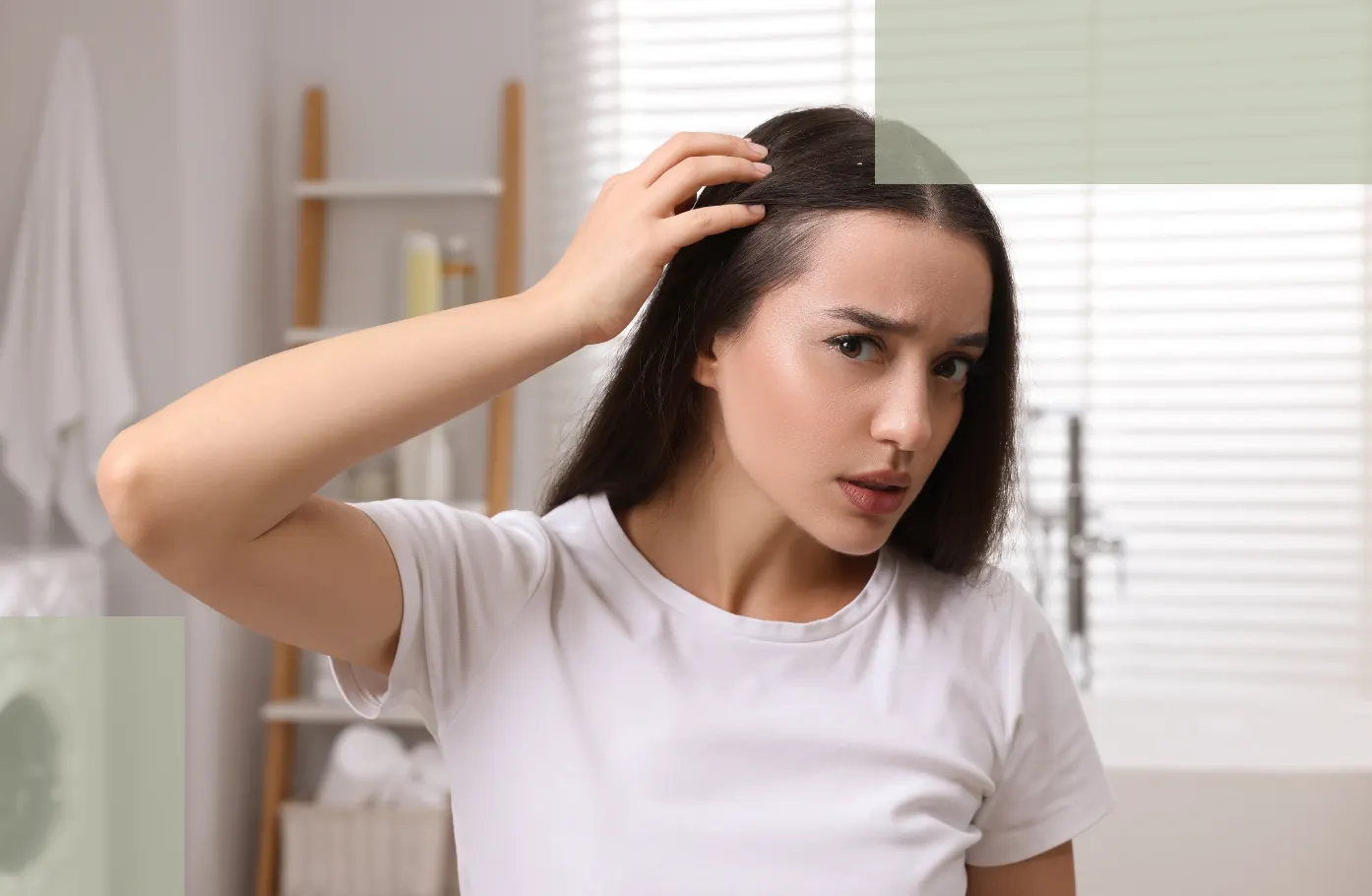🔗 Why Itching and Hair Loss Are Often Linked
Though it might not seem obvious, itchy scalp and hair loss often go hand in hand. Here’s why:
🩸 Inflammation: Conditions like seborrheic dermatitis and folliculitis inflame the hair follicles, disrupting the natural growth cycle and leading to increased shedding (UCF Health, n.d.).
🧪 Scratching Damage: Constant scratching can weaken the skin barrier and physically damage follicles, contributing to hair loss over time.
🧬 Underlying Conditions: Autoimmune conditions such as alopecia areata and lichen planopilaris often begin with scalp itching before visible shedding starts.
🌿 Product Reactions: Allergens in hair dye or harsh shampoos can irritate the scalp and lead to inflammatory hair loss (AAD, n.d.).
🩺 What Causes an Itchy, Shedding Scalp?
Here are the most common triggers:
- 🧴 Seborrheic Dermatitis
Caused by excess oil and yeast (Malassezia), it creates flakes, redness, and intense itch. Inflammation can disrupt follicles and cause telogen effluvium (temporary hair loss).
- 🦠 Folliculitis
Infected hair follicles appear as red, itchy bumps. These can scar over time and lead to patchy thinning.
- 🧪 Allergic Reactions / Contact Dermatitis
Sensitivity to ingredients like SLS, fragrance, or hair dyes can cause itching and weaken follicle health.
- 🧫 Fungal Infections (Tinea Capitis)
Common in children, this condition leads to ring-like patches of hair loss and crusty, itchy skin.
- ⚖️ Hormonal and Autoimmune Factors
Itchiness can precede or accompany forms of hair loss like androgenetic alopecia or frontal fibrosing alopecia, especially in women over 40 (Allure, 2021).
If your itchiness is linked to excess oil or dandruff buildup, seborrhoeic dermatitis may be the underlying cause. Discover how to treat seborrhoeic dermatitis and soothe scalp irritation using gentle, scalp-friendly routines that restore comfort and help prevent hair loss.
In some cases, itching isn’t the only sign your scalp needs attention—pain or tenderness may indicate deeper inflammation. Learn when scalp pain signals underlying inflammation or hair loss risk so you can take early action and protect your scalp health before shedding worsens.
💆 How to Relieve Itching and Support Hair Growth
🧴 Use a Scalp-Friendly Shampoo
Look for ingredients like:
- Zinc pyrithione – Anti-dandruff, anti-fungal
- Ketoconazole – Reduces Malassezia yeast and inflammation
- Salicylic acid – Gently exfoliates dead skin
- Tea tree oil – Soothes irritation naturally
🧼 Choose sulfate-free, fragrance-free options if you have sensitive skin(Evavitae shampoo is recommended).
✅ Try using a shampoo like Nizoral Anti-Dandruff (1% ketoconazole) twice a week to control flare-ups.
💧 Hydrate the Scalp
Dryness can worsen itching. Look for products with:
- Aloe vera
- Hyaluronic acid
- Niacinamide
- Colloidal oatmeal
These ingredients calm inflammation and strengthen the scalp barrier(click here to learn about the ingredients in Evavitae products).
🪮 Try Gentle Scalp Massage
Scalp massage increases blood circulation and may help reduce itching while improving nutrient delivery to follicles. Use soft silicone brushes or your fingertips 5 minutes a day.
📌 Bonus: Combine massage with a few drops of diluted rosemary oil, which may help stimulate hair growth (Panahi et al., 2015).
🌿 Apply Soothing Oils and Serums
Here are safe, non-steroidal options:
- Coconut oil – Antifungal, calming
- Rosemary oil – May match minoxidil for hair regrowth
- Peppermint oil – Cools itchiness
- Scalp serums with niacinamide and oat extract
⚠️ Always dilute essential oils in a carrier oil (e.g., jojoba or almond oil) and patch-test before full application.
🛌 Manage Internal Factors
Chronic stress, poor sleep, and low iron can trigger both itching and shedding:
- 🧘 Practice stress-reduction techniques like breathwork or yoga
- 🍽️ Ensure you’re getting enough iron, zinc, and vitamin D
- 💊 Speak to a doctor about scalp-safe supplements if you’re experiencing persistent shedding
🧑⚕️ When to See a Professional
If you notice any of the following, it’s time to consult a dermatologist:
❗ Sudden clumps of hair falling out
❗ Bald patches or scarring
❗ Intense itching that doesn’t go away
❗ Signs of infection (oozing, crusting, swelling)
Some forms of alopecia and scalp inflammation require prescription treatments, such as topical steroids or immunomodulators.
For expert-backed postpartum hair care routines, see the Complete Recovery Hub.
🔍 What the Research Says
📊 A 2016 study showed that individuals with sensitive scalps were more likely to report hair loss, suggesting a strong link between inflammation, itching, and shedding.
📊 Rosemary oil applied for 6 months showed similar efficacy to 2% minoxidil in people with androgenetic alopecia—minus the side effects (Panahi et al., 2015).
🌟 Final Thoughts
Scalp itch and hair loss can be stressful—but they’re not unsolvable. From gentle shampoos(like Evavitae) to calming oils(try Evavitae Hair Renewal Serum) and mindful self-care, small consistent changes can make a big difference.
💡 Remember: treat your scalp like skin. Because it is.
✨ For gentle, everyday habits that keep your scalp balanced, visit the Scalp Care & Routine Hub.
📚 References
- American Academy of Dermatology (AAD). (n.d.). Relieve scalp itch. https://www.aad.org/public/everyday-care/itchy-skin/itch-relief/relieve-scalp-itch
- Panahi, Y., Taghizadeh, M., Marzony, E. T., & Sahebkar, A. (2015). Rosemary oil vs. minoxidil 2% in the treatment of androgenetic alopecia. Skinmed, 13(1), 15–21. https://pubmed.ncbi.nlm.nih.gov/25842469/
- UCF Health. (n.d.). Seborrheic dermatitis and hair loss. https://ucfhealth.com/our-services/dermatology/seborrheic-dermatitis-hair-loss-treatment
- Allure. (2021). What is frontal fibrosing alopecia?https://www.allure.com/story/frontal-fibrosing-alopecia
Evavitae products are now available exclusively at www.evavitae.com.





Add comment
You must be logged in to post a comment.